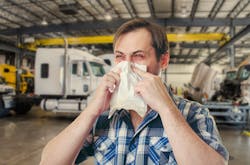The importance of cabin air filter replacement
Logging those long miles during the summer months can put a serious strain on fleet vehicles and their operators. For the occupants of a heavy duty vehicle’s cabin, comfort is critical to remaining alert and staying safe behind the wheel. In hot weather, a properly functioning air conditioning system is a must, but a component that’s equally essential (if not more so) is a quality cabin air filter.
Impact of poor cabin air filtration
Extremely high temperatures during summer months can wreak havoc on drivers. Even without cracking a window, drivers are still susceptible to allergens, pollutants and other seasonal nuisances that enter a vehicle’s passenger compartment through the air conditioning and ventilation systems.
When these systems draw in outside air and the windows are closed, contaminants such as mold spores, bacteria, pollen, diesel soot, dirt, dust, exhaust gases and smog begin to accumulate inside the cabin, potentially multiplying to concentrations of between five to eight times higher than normal. A poorly ventilated passenger compartment can also become covered in a fine layer of dust as contaminants settle on all of the surfaces. This allows the contaminants to remain in the cabin even longer.
Heavy duty cabin air filters provide protection to help prevent contaminants from reaching the vehicle’s interior. These filters are available in two types:
- A particulate filter that can remove up to 98 percent of airborne pollutants. This filter type features a multi-layer pleated design for more particle-capturing surface area.
- An activated-charcoal filter, like the Luber-finer Extreme Clean HD Premium Cabin Air Filter. This filter also has baking soda to capture particulates and absorb odors as well as most toxic or foul-smelling gases such as ozone, sulfur dioxide, hydrocarbons and nitrogen oxide.
Benefits to the A/C system
Cabin air filters contribute to the proper operation of the vehicle’s air conditioning system, which keeps extreme summer heat at bay. Vents blowing air with noticeably less force are one of the symptoms of an excessively dirty cabin air filter that needs to be replaced. Poor air flow can reduce the overall cooling capacity of the air conditioning system and also place an additional strain on the A/C blower motor. This can lead to a costly system failure and extremely uncomfortable driving conditions.
Ideally, fleets shouldn’t wait for restricted air flow to occur before considering changing the cabin air filters in a fleet’s vehicles. At minimum, fleets should replace the cabin air filter with a new unit every 12,000 to 15,000 miles. Seasonal replacement to protect against pollutants created during different times of the year is also recommended for vehicles that regularly experience harsh temperatures or severe climate changes.
Fortunately, installing a cabin air filter is not difficult and should not discourage regular maintenance. In most trucks, the cabin air filter is located under the hood at the outside air intake along the firewall on the passenger side. This is where outside air passes through the filter before it enters the cabin. The filter’s housing is often clearly marked and easy to access, so a service technician can usually complete a cabin air filter replacement in 15 to 30 minutes.
Whether it is minimizing the possibility of allergic reactions or ensuring that a heavy duty vehicle’s air conditioning system is keeping the operating environment as comfortable as possible, a cabin air filter should be considered essential equipment for the summer season.
Zafar Hussain is a Senior Product Engineer at Luber-finer. He has worked in the filtration industry since 2002 and has multiple patents under his name, including Luber-finer’s Heavy-Duty Time Release Technology (TRT) Oil Filter.
...
[PHOTO CAPTIONS] – 1 total
File name: SIDEBAR #2 - Luber-finer - driver-blowing-nose.jpg
Caption: Drivers can be susceptible to allergens, pollutants and other seasonal nuisances that enter a vehicle’s passenger compartment through the air conditioning and ventilation systems, especially if the cabin air isn’t properly filtered.
Credit: Photo courtesy of Luber-finer
